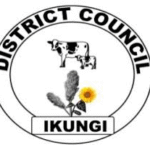About Company
Ikungi District Council, located in the Singida Region of central Tanzania, was established on 8 March 2013 when it was carved out of Singida Rural District.
📍 Geography & Demographics
-
Area: About 8,860 km² (ranking ~15% of Singida Region) .
-
Elevation: Situated on the central plateau at 1,200–1,500 m above sea level.
-
Climate: Semi-arid — 600–700 mm annual rainfall, temperatures range between 15–30 °C.
-
Population: Grew from ~262 k in 2012 to ~411 k in 2022.
-
Ethnic Groups: Majority Nyaturu (also called Turu), with Iramba, Isanzu, Datooga, Kimbu, and Nyamwezi.
🏛️ Administrative Breakdown
-
Divided into 4 divisions: Mungaa, Ikungi, Ihanja, Sepuka.
-
Contains 26–28 wards, ~101 villages, and ~545 hamlets.
-
Administrative seat: Ikungi town, an administrative ward with ~12,700 residents in 2012.
🚗 Infrastructure & Transport
-
Roads: 2,180 km of roads, including 109 km of district roads and 930 km of feeder roads.
-
Transport routes: Paved trunk road T3 transits the district (linking Morogoro to Rwandan border); Singida branch railway also passes through, with a station at Ikungi town
🌾 Economy & Livelihoods
-
Agro‑pastoral economy: Dominated by mixed cropping (sorghum, millet, finger millet, sunflower, maize, sweet potato, groundnuts) and livestock rearing.
-
Agricultural zones: Western/south-western areas have fertile soils, while most land supports semi-arid cropping.
-
Livestock numbers (2019): hosts ~34% of Singida Region’s cattle (~418,000), ~32% of goats, ~28% of sheep, and ~35% of poultry.
-
Mining: Small‑scale mining occurs, notably at Londoni.
-
Energy sources: Predominantly biomass—charcoal, wood, kerosene, plus limited solar installations.
🌳 Environment & Development
-
The district is exploring carbon-trading opportunities through its forest management, projected to generate ~20 bn TZS annually.
-
Land classification: ~2,580 km² for agriculture, 2,887 km² for pasture, with shrubs and woodland in remaining areas.
✅ Summary
Ikungi District Council plays a vital role in central Tanzania’s agro-economic landscape. Established in 2013, it spans a large semi-arid plateau and supports a growing agro-pastoral population. Improved transport links (road and rail) and efforts in forest-based carbon trading highlight development potential. However, energy access and food security remain challenges due to climate variability and infrastructure gaps.



Be a First Reviewer